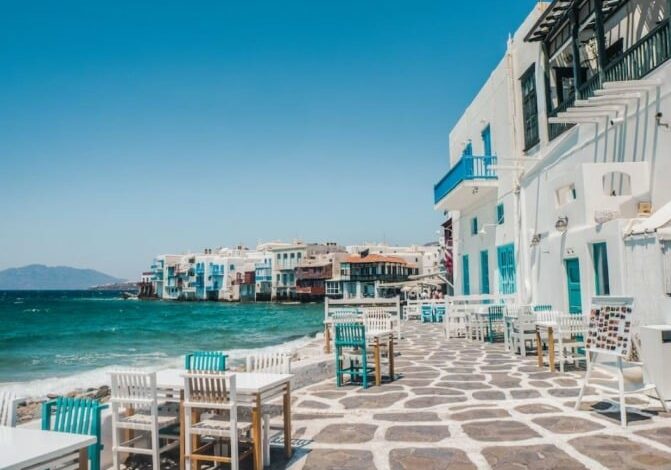If you’re considering living abroad as an American expat, Greece offers a captivating blend of ancient history, modern amenities, and a relaxed Greek way of life. While Greece is becoming an increasingly popular expat destination, there are many Americans living in Greece already, enjoying the benefits of the country’s Golden Visa program, its perks as a tax residence, and its more laid-back lifestyle. However, there are cons of living in Greece too.
This article will cover the pros and cons of living in Greece as an American.
5 Benefits of Living in Greece

Here are the main benefits of life in Greece:
- Affordable cost of living: The lower costs of living, lower housing costs, and a strong US dollar have enticed many Americans to relocate to Greece and enjoy a Mediterranean lifestyle.
- Warm weather: The weather in Greece is warm all year round.
- Progressive system: Living standards have risen since joining the EU, and the infrastructure has undergone significant enhancements. Whether you live in Athens or on a remote island in Greece, the improvements in transportation, communication, and public services are evident.
- Rich history and culture: Life in Greece comes with many perks, such as access to museums and cultural sights. It’s hard to get bored in Greece.
- Amazing cuisine: By moving to Greece as an American, you get to enjoy Greek moussaka, souvlaki, and pastitsio. Greek cuisine is rich in feta cheese, olives, olive oil, and tomatoes.
Pros and Cons of Living in Greece as an American
Cost of living in Greece
Pros:
Cons:
Greece has a relatively low cost of living, but prices are raised in the most popular tourist destinations to profit from the seasonal influx of tourists. Living on a lesser-known island or city sees drastic reductions in living costs for practically everything, including housing and food.
Despite low living costs, the economy in Greece remains fragile, with high unemployment rates.
Accommodation in Greece
Pros:
The selection of options may vary depending on where expats choose to live. Stone farmhouses are prominent in the countryside, while villas and apartment buildings are prevalent in urban areas. There are also cottages and freestanding, semi-detached homes all around the country.
With so many possibilities available, Americans living in Greece should be able to find housing that fits their budget and preferences.
Cons:
Period housing is a common sight in Greece. Before purchasing a house to live in or as a qualifying financial investment for the Golden Visa to obtain a permanent residence permit, expats should visit the property and evaluate the building’s age and condition. If expats inadvertently purchase a dilapidated property, they might risk incurring unanticipated remodeling and restoration fees.
Greek lifestyle
Pros:
Living in Greece as an American offers a refreshing change of pace, as the Greek laid-back lifestyle appeals to many who wish to escape the fast-paced work culture. The Greek population typically takes their time with daily tasks, balancing hard work with an appreciation for life’s small joys. For those accustomed to a high-pressure environment, adjusting to this slower rhythm may take time.
A source of pride for Greek citizens is the country’s incredible food culture. Greece is a foodie’s paradise, offering fresh local ingredients, delicious seafood, and flavorful meats. The Mediterranean diet is not only rich in taste but also known for its health benefits, contributing to Greece’s long average life expectancy. Living in Greece as an American means enjoying a lifestyle where quality food, relaxation, and well-being go hand in hand.
Cons:
Precisely because the Greeks love a laid-back lifestyle, this leads to slower bureaucracy, shorter business hours, and a lack of career advancement opportunities. Since Americans are used to a fast-paced lifestyle and culture, this might seem limiting to you.
Beautiful scenery in Greece
Pros:
Greece is famous for its amazing landscapes, including pristine beaches, stunning islands like Santorini, Crete, and Mykonos, and diverse wildlife in the mountains. You will never run out of things to do in Greece when it comes to outdoor activities since you can go hiking, sailing, swimming, and even diving.
On top of that, you can visit tourist attractions that hold cultural significance, like ancient temples and ruins.
Cons:
The biggest downside of Greece is overcrowding in tourist areas, namely places like Santorini and Athens which attract thousands and thousands of visitors each year. Besides that, you might struggle to reach more rural areas due to poor infrastructure. Some areas of Greece aren’t well-connected and to visit them, you need to rent a car or organize a different way of traveling.
Greek economic outlook
Pros:
Greece has undergone economic reforms, attracting foreign investors with promising opportunities across various sectors. Notably, the Greece Golden Visa program offers a pathway to residency by investing in real estate, making Greece an appealing destination for those seeking European residency. Additionally, the strategic location of Greece within the European Union and bordering the Middle East, Africa, and mainland Europe facilitates business opportunities and trade relations.
The Greece Non-Dom Tax regime offers favorable taxes in Greece, making it a notable pro for Americans considering living in Greece. The country has a double taxation treaty with the United States, so US citizens eligible for the Non-Dom Tax regime can avoid double taxation and take advantage of the tax benefits offered.
Con:
The 2008 Financial Crisis left a lasting impact on the country. The crisis resulted in a severe economic downturn, soaring unemployment rates, and widespread austerity measures, with the subsequent bailout of the Greek economy. While the country has made efforts towards recovery, the repercussions of the economic crisis are still felt, and Greece continues to grapple with economic challenges.
Safety in Greece
Pros:
Greece has a relatively low crime rate. The nation ranked 60th on the 2023 Global Peace Index, significantly higher than the United States ranking of 131st. The most frequent crimes in Greece are non-violent ones like pickpocketing and handbag stealing. Expats living in Greece and foreigners who visit Greece on a tourist visa generally experience a safe environment.
Cons:
It’s important to note that large tourist destinations, such as Athens, can have higher crime rates due to pickpocketing.
On top of that, Greece is prone to natural phenomena such as earthquakes, wildfires, and even flooding. Wildfires typically occur in summer, while earthquakes might happen throughout the entire year.
Greek culture and language
Pros:
US expats find that most Greeks are exceedingly hospitable and welcoming. Greek people are known for hospitality and cherish connections, especially over a good meal. They are also proud of their heritage and culture. Any attempts by expats to communicate with the locals in Greece will be warmly welcomed.
Cons:
While many Greeks speak English in popular tourist destinations, Americans seeking a permanent residence permit in Greece would enjoy a better living experience if they decided to learn Greek.
Furthermore, those seeking employment opportunities with a Greek employer would greatly benefit from acquiring proficiency in the Greek language, and a Greek employer may only consider applicants with a reasonable command of Greek. However, the Greek language has distinct spoken and written varieties and regional idioms; therefore, learning this language might be challenging for most expats.
Greek weather
Pros:
Those living in Greece enjoy a warm Mediterranean climate throughout the year. Even though rain occasionally interrupts the ever-lasting sunshine, there aren’t many days with rain. Summers are hot but are tempered by a refreshing sea wind, and winters are pleasant and bright.
Cons:
Summers in Greece can get extremely hot, especially in July and August, with temperatures sometimes exceeding 40°C (104°F). Heat waves may make daily activities uncomfortable during peak summer months.
Key Cost of Living Differences: Greece vs. the US
Numerous comparisons show that Greek living expenses are less than US living expenses. For a single person in Greece, the average cost of living in Greece is about $880 per month, without rent. From housing and dining out to the healthcare system and even hair care, the average cost of living in Greece is much lower than in the United States and other countries in Europe.
Below is a comparison of Greece’s average cost of living versus the United States for several core expenses.
Item | Greece | United States |
Rice | $2.42 | $4.64 |
Beef (1kg) | $13.44 | $16.12 |
Chicken (1kg) | $10.26 | $12.31 |
Public transport monthly pass | $32.64 | $80 |
Basic utilities | $237.92 | $214.02 |
Mid-range restaurant for two | $54.40 | $75.99 |
Concerning accommodation, Americans living in Greece benefit from a much lower cost of renting real estate and buying property.
Accommodation | Greece | United States |
Rent for a one-bedroom apartment (city center) | $550 | $1,840 |
Rent for a three-bedroom apartment (city center) | $900 | $3,080 |
Rent for a one-bedroom apartment (outside the city center) | $440 | $1,500 |
Rent for a three-bedroom apartment (outside the city center) | $770 | $2,490 |
Purchase price per m2 (city center) | $2,870 | $7,800 |
Purchase price per m2 (outside the city center) | $2,470 | $5,300 |
According to Numbeo, life in Greece is substantially less expensive overall. With that said, gas prices are higher on average in Greece at $2.14 per liter compared to $0.97 per liter in the United States.
Moving to Greece: Visa Options for Americans
When moving to Greece as an American, you need to get a long-stay visa by visiting your nearest Greek Consulate or Embassy. It’s important to prepare all the paperwork beforehand.
Greece Digital Nomad Visa
Greece digital nomad visa is one of the main ways to reside in Greece long-term. Through this visa, you can live in Greece as an American for up to two years. Initially, this is given for one year, but you can extend your stay.
It’s important to note you provide relevant paperwork proving you’re working for an employer outside of Greece and you have sufficient financial means to support yourself and your family. The threshold for financial means is typically €3,500.
Greece Golden Visa
The Greece Golden Visa program is another great way for Americans to move to Greece. The advantage of the program is it allows investors to purchase property and obtain permanent residency. The main requirement is to buy a property for at least €250,000.
However, the program’s popularity has seen the minimum investment rise to €800,000 for purchases in specific regions, including northern and central provinces, the South Athens Attica region, and the municipalities of Thessaloniki, Mykonos, and Santorini. The minimum investment for real estate for the rest of Greece is €400,000. The threshold of €250,000 only applies when purchasing properties that have been converted from commercial use to residential one, and to properties of historical significance that have been restored.
For US expats uninterested in real estate investment, the Greek government provides several alternatives to qualify for the program, including:
- €400,000 investment in a Greek company
- €500,000 deposit in a Greek bank account
- €500,000 purchase of government bonds
Top 3 Greek Cities for American Expats
The Greek economy has seen substantial growth, and expats buying Greece Golden Visa properties have played a notable role in contributing to the country’s economic resurgence.
Greece’s numerous islands and peninsulas provide a variety of living options. Greece has no limitations on foreigners purchasing real estate there. Therefore, Americans own property in various cities and regions of the country.
1. Thessaloniki
One of the cheapest cities in Greece is Thessaloniki, the country’s second-largest metropolis. Although the city is in the country’s north, it still borders the sea. Thessaloniki is a port city situated on the low slopes of a protected bay, making it a hub for fishing boats, large yachts, and adventurous swimmers.
Thessaloniki has a more laid-back vibe than Athens, where people are exposed to the capital’s hectic, frenetic atmosphere. The art of doing nothing, eating delicious food, and some inspiring Greek culture are all presented in Thessaloniki’s everyday routine, making this city one of the best places for expats to live in Greece.
The influence of the Roman, Byzantine, Ottoman, and Greek empires demonstrates the city’s rich cultural heritage. As a result, the city is culturally diverse and offers a vast selection of cuisines to satisfy all tastes. Natural items grown in the Fertile Delta, including herbs, camellias, and other crops. As a result, the market is constantly stocked with delicious fresh food.
Greek ancient ruins, antique structures, and historical vignettes are also present in the city, contributing to its lovely traditional ambiance. The city is adorned with stunning arches, marble columns, churches, temples, and authentic frescoes.
You could find Thessaloniki even more attractive than the southern Mediterranean climate. The city offers everything, from delicious Greek cuisine and authentic Greek culture to an ideal winter climate.
2. Patras
Patras, located northwest of the Peloponnese, provides some of Greece’s best nightlife. The city center is jam-packed with pubs, nightclubs, museums, and stores. Since Patras is also a port city, there is a lot of business activity there.
The location of Patras is great for Americans who enjoy outdoor activities. Anyone wishing to appreciate the Greek countryside will find it a true paradise due to its proximity to the sea, many Greek islands, and mountains.
Although the city boasts a distinctive old town with lovely stone walls and archaeological monuments, many side alleys off Korinthou and Maizonos are pedestrian-only streets filled with every kind of amenity, club, bar, gallery, museum, and store you can imagine.
The cost of living here is relatively low. Prices are lower than in other cities because of the healthy competition among its many enterprises. Patras combines the essence of a small town with the fundamental objectives and commercial potential of a large city. It should be a top choice if you desire to live in a bustling city with easy access to nature.
3. Chania, Crete
Chania is one of Greece’s most well-liked cities among US expats and the second-largest city in Western Crete. Over the past 30 years, the American expat community in Crete has grown. Here, there is a far stronger sense of community and support from other expats than on the mainland. As a result, Crete is among the best places in Greece for expats.
There is a lovely old town district and a peaceful old Venetian harbor on Chania’s northern coast. Stunning mosques dominate both and are frequently bustling with cafes, restaurants, and pubs in front, just like the rest of the city.
Chania’s ample size allows for the comfortable accommodation of its population. The city is still an excellent destination to visit in the winter even after all tourists have left, as winters in Chania are considerably warmer than in Northern Greece.
Travel around the island is limited to cars and a few local buses which navigate the winding mountain roads. Owning a vehicle is advisable. However, Crete’s location makes reaching both the mainland and adjacent islands easy.
Working in Greece as an American
Can I work in Greece as a US citizen?
While the Greece Golden Visa grants a permanent residence permit, it does not include the right to work until Golden Visa holders receive unconditional permanent residency after five years. On top of that, if you get a Greek digital nomad visa, you can’t work for a Greek employer.
US citizens need to obtain a work permit and work visa to work in Greece. Types of work visas for Greece are: general work visas, specialized work visas, and seasonal work visa.
Best jobs for Americans living in Greece

- Information technology
- Healthcare professionals
- Tourism workers
- Engineers
- Teachers and education professionals
- Marketing and sales professionals
- Finance professionals
- Construction workers
However, the country has a relatively high unemployment rate, and jobs for US citizens may be competitive.
Remote work for Americans in Greece
Greece is a great destination for remote workers and digital nomads. Greece digital nomad visa is an amazing opportunity to live in Greece while working for a foreign employer.
US citizens can find a remote job in their country of origin and still enjoy life in Greece, which is affordable with a US salary. There are also several coworking spaces in the country, such as cafes, that allow for remote work.
Digital nomads and remote workers have plenty of options when it comes to life in Greece—from historical cities to distant islands.
Healthcare in Greece for Americans
The Greek healthcare system consists of private and public healthcare. Both Greeks and foreigners have access to the Greek healthcare system, as long as they contribute to the national health insurance and possess social security numbers. The Greek healthcare system (also known as EFKA) is free for all residents.
Referrals are not necessary for Greece’s healthcare system. Residents can visit National Health System facilities to speak with specialists directly and receive medical care. Greek doctors can write patient prescriptions online thanks to the country’s e-prescription system.
The Greek public healthcare system offers medical services through contracted commercial providers and state-run healthcare organizations. The services are free or cheap for American expats who pay into the social security system.
In Greece, waiting times can be long, resulting in many Americans opting for private health insurance. Private health insurance providing full coverage is much cheaper than in the United States.
Traveling in Greece
There is an abundance of transportation alternatives in Greece, which makes getting around the country straightforward.
The main ways of travel in Greece are:
- Train- This can be used for traveling between cities and smaller places.
- Tram- Greeks use trams as one of the main ways to get around a city.
- Subway- Subway is most commonly used when traveling in a big city.
- Bus- Bus is a great alternative if you don’t want to travel by train or if the area you’re traveling to isn’t well-connected.
- Cab- This is also used as a way to move around cities.
- Boat- Boat is the main means of travel for reaching Greek islands.
Although a new metro system is due to open in Thessaloniki in 2024, buses are the primary mode of transportation in Greece, departing from most cities and small towns.
Greece has a large number of islands, and ferries are widely used as a means of transportation across them. The country has numerous ports to transport both passengers and cargo. Some people even prefer boarding a ferry to flying across Greece.
Can you drive in Greece with an international permit?
According to Greek regulations, foreign drivers must possess both an IDP (International Driver’s Permit) and a state-issued driver’s license. A Greek driver’s license is also required if you plan to stay in Greece for longer than six months. Contact the nearest Ministry of Transport and Communications in Greece to apply for a Greek license. You must prepare to pay taxes, namely a stamp tax of €18 and a printing cost of €30 to receive it.
How Can Global Citizen Solutions Help You?
Global Citizen Solutions is a boutique migration consultancy firm with years of experience delivering bespoke residence and citizenship by investment solutions for international families. With offices worldwide and an experienced, hands-on team, we have helped hundreds of clients worldwide acquire citizenship, residence visas, or homes while diversifying their portfolios with robust investments.
We guide you from start to finish, taking you beyond your citizenship or residency by investment application.

Frequently Asked Questions about Americans Living in Greece
Is Greece a good place to live for Americans?
While the country has both its advantages and disadvantages, Greece can be an excellent place to live for Americans due to its vast history, sprawling islands, and modern amenities. The relatively low crime rate and low cost of living allow many Americans retiring in Greece to enhance their standard of living, and foreign residents can further improve their finances through the Greece Non-Dom Tax regime and double taxation treaties with numerous other countries, including the United States.
Where do American expats live in Greece?
You will find most American expats living in these places:
- Crete
- Athens
- Kos
- Thessaloniki
- Corfu
- Rhodes
How much money do you need to live comfortably in Greece?
How much it costs to live comfortably depends on where you live, your lifestyle preferences, and your circumstances. Generally speaking, a monthly budget of $2,000 should provide a comfortable standard of living, covering average monthly expenses along with the cost of renting a one-bedroom apartment.
How long can you live in Greece as an American?
How long you can live in Greece as an American depends on your residency status. If you hold a temporary residence permit, you can live in Greece for the period specified in your permit, which may be granted based on factors like employment, studies, or family reunification.
The Greece Golden Visa allows Americans to live in Greece indefinitely, provided they make the necessary qualifying investment and maintain their investment for five years. Americans can apply for Greek citizenship after seven years of residency.
Are people in Greece friendly to Americans?
Generally, Greek people are known for their warmth and hospitality towards Americans and other foreign nationals. Greeks, especially in tourist areas and larger cities, are accustomed to interacting with international visitors and often speak English. While the level of friendliness can vary depending on the region and individual personalities, Americans living in Greece typically have positive encounters with locals across Greece.



